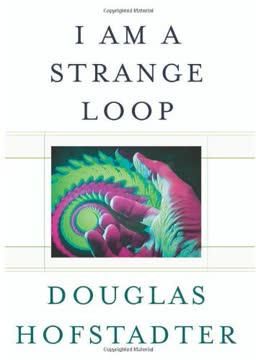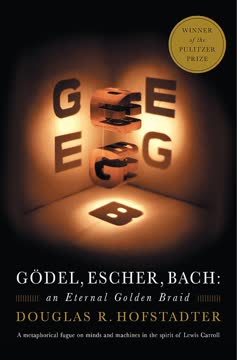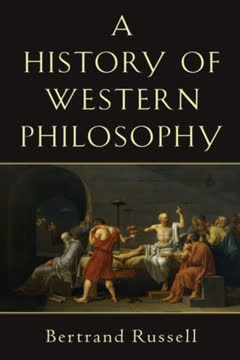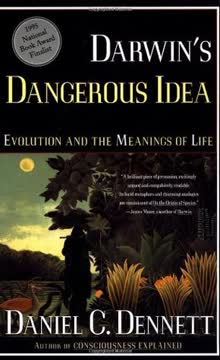Key Takeaways
1. Consciousness is not a unified stream, but multiple drafts of content
There is no single, definitive "stream of consciousness," because there is no central Headquarters, no Cartesian Theater where "it all comes together" for the perusal of a Central Meaner.
Multiple Drafts Model. Instead of a single stream of consciousness, our brain processes information in parallel through multiple specialized circuits. These circuits create various "drafts" of content, which are constantly edited and revised. Some drafts persist and influence behavior, while others fade away quickly.
- Key aspects of the Multiple Drafts Model:
- Parallel processing of information
- Constant editing and revision of content
- No central "audience" or "meaner"
- Drafts compete for influence on behavior and memory
This model explains phenomena like the color phi experiment, where subjects report seeing a moving spot change color before the second stimulus is presented. Rather than "backwards referral in time," this is simply the brain's best interpretation based on available information.
2. The brain doesn't have a central "Cartesian Theater" for consciousness
There is no one place in the brain through which all these causal trains must pass in order to deposit their content "in consciousness."
Distributed Processing. The idea of a central place in the brain where consciousness happens - a "Cartesian Theater" - is deeply flawed. Instead, consciousness emerges from the distributed processing of information across various brain regions.
- Problems with the Cartesian Theater concept:
- No neuroanatomical evidence for a central consciousness area
- Timing issues (e.g., the "Cartesian bottleneck")
- Inability to explain complex phenomena like blindsight
The brain's architecture is more like a "pandemonium" of competing specialists, each contributing to our conscious experience without a central coordinator. This distributed model better explains the flexibility and complexity of human consciousness.
3. Language shapes our thoughts and inner experiences
Looking at ourselves from the computer viewpoint, we cannot avoid seeing that natural language is our most important "programming language."
Linguistic Scaffolding. Language is not just a tool for communication; it fundamentally shapes our thoughts and inner experiences. It provides a structure for organizing our mental content and allows us to manipulate complex ideas.
- Ways language influences cognition:
- Provides categories and concepts for thinking
- Enables abstract reasoning and planning
- Shapes our internal monologue and self-reflection
- Allows for cultural transmission of ideas (memes)
The acquisition of language dramatically alters our cognitive landscape, creating new possibilities for thought and consciousness. This "linguistic scaffolding" is a crucial aspect of human consciousness that distinguishes us from other animals.
4. Qualia and phenomenal experiences are not as mysterious as they seem
If I couldn't talk to myself, I'd have no way of knowing what I was thinking.
Demystifying Qualia. The idea of ineffable, intrinsic qualities of experience (qualia) is often seen as a major challenge to materialist theories of consciousness. However, these supposedly mysterious qualities can be explained through the brain's information processing and our ability to reflect on our experiences.
- Reasons to be skeptical of qualia:
- No clear evidence for their existence beyond our reports
- Can be explained by complex information processing
- Often conflated with the content of experiences
Rather than positing special "mental stuff," we can understand phenomenal experiences as the result of our brain's ability to process, categorize, and reflect on sensory information. The feeling of "what it's like" to have an experience emerges from this complex interplay of information processing and self-reflection.
5. The brain doesn't "fill in" missing information, it ignores gaps
The fundamental flaw in the idea of "filling in" is that it suggests that brain is providing something when in fact the brain is ignoring something.
Efficient Representation. Contrary to popular belief, the brain doesn't "fill in" missing information in phenomena like the blind spot or neon color spreading. Instead, it efficiently represents the world by ignoring gaps and generalizing from available information.
- Examples of efficient representation:
- Blind spot: not filled in, simply ignored
- Neon color spreading: labeling of regions, not pixel-by-pixel filling
- Wallpaper illusion: generalization from limited samples
This approach is computationally efficient and explains why we don't notice many gaps in our perception. It also challenges the idea that consciousness involves creating a detailed internal replica of the world.
6. Consciousness evolves through three processes: genetic, phenotypic, and memetic
Human consciousness is itself a huge complex of memes (or more exactly, meme-effects in brains) that can best be understood as the operation of a "von Neumannesque" virtual machine implemented in the parallel architecture of a brain that was not designed for any such activities.
Evolutionary Layers. Human consciousness is the result of three evolutionary processes layered on top of each other:
- Genetic evolution: Provides the basic neural architecture
- Phenotypic plasticity: Allows for individual learning and adaptation
- Memetic evolution: Cultural transmission of ideas and mental habits
This layered approach explains the complexity and flexibility of human consciousness. Memes, in particular, play a crucial role in shaping our conscious experiences and cognitive abilities, allowing for rapid cultural evolution beyond genetic constraints.
7. Our sense of self is a "user illusion" created by the brain
What I am suggesting is that there is nothing more to being in the background of experience than that.
Virtual Self. Our sense of a unified, conscious self is akin to a "user illusion" created by the brain. Just as a computer's user interface simplifies complex underlying processes, our sense of self provides a simplified model of our brain's distributed processes.
- Aspects of the "user illusion" of self:
- Feeling of unity and continuity
- Sense of agency and free will
- Illusion of detailed perceptual awareness
This model explains why our conscious experience feels unified despite the distributed nature of brain processing. It also accounts for phenomena like confabulation, where we create post-hoc explanations for our actions.
8. Blindsight reveals the complexity of visual processing and consciousness
Blindsight involves (1) receipt of visual information that is (2) nevertheless unconscious.
Unconscious Processing. The phenomenon of blindsight, where people with certain types of brain damage can respond to visual stimuli they don't consciously see, reveals the complexity of visual processing and consciousness.
- Key insights from blindsight:
- Visual processing can occur without conscious awareness
- Consciousness is not necessary for some types of visual-guided behavior
- Challenges simple models of visual consciousness
Blindsight suggests that consciousness is not a simple result of sensory processing, but involves additional processes of integration and access. It also raises questions about the relationship between conscious experience and unconscious information processing.
9. The timing and order of conscious experiences are not fixed or absolute
The fundamental principle that causes must precede effects applies to the multiple distributed processes that accomplish the editorial work of the brain.
Flexible Timing. The brain's distributed processing means that the timing and order of conscious experiences are not fixed or absolute. Instead, they are constructed based on the brain's best interpretation of available information.
- Implications of flexible timing:
- Explains phenomena like the color phi effect
- Challenges the idea of a fixed "stream of consciousness"
- Suggests consciousness is more like editing than experiencing
This view resolves apparent paradoxes in the timing of conscious experiences and explains why our subjective sense of time can sometimes differ from objective measures.
10. Introspection is not a reliable way to understand consciousness
We must break the habit of positing ever-more-central observers.
Limits of Introspection. While introspection can provide valuable data about our conscious experiences, it is not a reliable method for understanding the underlying mechanisms of consciousness.
- Reasons to be skeptical of introspection:
- Prone to confabulation and post-hoc rationalization
- Limited access to unconscious processes
- Influenced by our theories and expectations about consciousness
Instead of relying solely on introspection, a scientific understanding of consciousness requires a combination of behavioral experiments, neuroscientific studies, and philosophical analysis. This approach can help us move beyond intuitive but misleading models of consciousness.
Last updated:
FAQ
What's Consciousness Explained about?
- Exploration of Consciousness: Consciousness Explained by Daniel C. Dennett examines the nature of consciousness, aiming to demystify it through scientific and philosophical perspectives. It challenges traditional views like the Cartesian Theater, which suggests a central place in the brain for consciousness.
- Multiple Drafts Model: Dennett introduces the Multiple Drafts model, proposing that consciousness is not a singular experience but a series of parallel processes that interpret sensory inputs.
- Critique of Qualia: The book critiques the concept of qualia, arguing that they do not exist as separate, intrinsic properties of experiences. Instead, they are the results of complex interactions in the brain.
Why should I read Consciousness Explained?
- Challenging Perspectives: The book encourages readers to rethink their assumptions about consciousness and the mind, offering a fresh perspective that combines philosophy with empirical science.
- Interdisciplinary Approach: Dennett integrates insights from philosophy, neuroscience, and cognitive science, making it a rich resource for anyone interested in understanding the mind.
- Engaging Writing Style: Dennett's accessible prose and thought-provoking arguments make complex ideas understandable and engaging for a broad audience.
What are the key takeaways of Consciousness Explained?
- Consciousness is Complex: Consciousness is not a simple, unified experience but a complex interplay of various cognitive processes. Understanding this complexity is crucial for grasping how consciousness functions.
- Rejection of Dualism: Dennett rejects dualism, advocating for a materialistic view that consciousness arises from physical processes in the brain.
- Heterophenomenology as Method: Introduced as a way to study consciousness objectively, heterophenomenology involves interpreting individuals' reports of their experiences while remaining neutral about their reality.
What is the Multiple Drafts model in Consciousness Explained?
- Parallel Processing: The model posits that consciousness arises from multiple parallel processes in the brain that interpret sensory information, allowing different aspects of an experience to be processed simultaneously.
- No Central Theater: Unlike the Cartesian Theater model, the Multiple Drafts model argues that there is no single point in the brain where consciousness occurs.
- Dynamic Editing: The brain continuously edits and revises these drafts, leading to a fluid and dynamic experience of consciousness.
How does Dennett address the problem of qualia in Consciousness Explained?
- Qualia Disqualified: Dennett challenges the traditional notion of qualia by arguing that they do not exist as independent entities but are results of cognitive processes and interpretations.
- Focus on Function: He emphasizes the functional role of experiences in consciousness rather than their subjective qualities.
- Empirical Approach: Dennett advocates for scientific investigation to provide insights into the mechanisms behind what we perceive as qualia.
What is heterophenomenology, and how is it used in Consciousness Explained?
- Definition of Heterophenomenology: It is Dennett's method for studying consciousness that involves interpreting individuals' reports of their experiences while maintaining a neutral stance.
- Constructing a Fictional World: This approach allows for a systematic exploration of consciousness by treating subjects' reports as creating a fictional world.
- Avoiding Bias: Heterophenomenology helps avoid biases from personal beliefs or assumptions about consciousness, focusing on what subjects report.
How does Dennett explain hallucinations in Consciousness Explained?
- Internal Stimulation: Hallucinations occur due to internal stimulation of the brain's perceptual systems, generating vivid experiences without external reality.
- Passivity in Hallucinations: Individuals experiencing hallucinations often exhibit passivity, not actively engaging with the hallucinated content.
- Cognitive Processes: Hallucinations are understood as the brain's attempts to make sense of internal signals, leading to experiences that feel real.
What are the implications of Consciousness Explained for understanding free will?
- Materialistic View of Free Will: Free will is seen as a product of complex brain processes, challenging traditional notions of it as separate from physical reality.
- Conscious Decision-Making: Conscious decision-making arises from the brain's ability to process information and generate options, grounded in neural activity.
- Revising Responsibility: Understanding the mechanisms behind decision-making can inform views on accountability, encouraging a nuanced understanding of human behavior.
How does Consciousness Explained relate to contemporary debates in cognitive science?
- Integration of Disciplines: Dennett's work bridges philosophy, neuroscience, and psychology, contributing to ongoing discussions about the nature of consciousness.
- Challenging Traditional Views: The book challenges established theories, prompting researchers to reconsider their assumptions about consciousness.
- Influence on Future Research: Dennett's ideas have influenced subsequent research, particularly in areas related to perception, memory, and the nature of consciousness.
How does Dennett define the self in Consciousness Explained?
- Self as Narrative: The self is defined as a "Center of Narrative Gravity," shaped by the stories we tell about ourselves, emphasizing language and social interaction.
- Dynamic and Evolving: The self is a dynamic construct that evolves over time as we accumulate experiences and memories.
- Interconnectedness: The self is interconnected with various cognitive processes and social contexts, highlighting the importance of relationships in shaping identities.
What role does language play in Consciousness Explained?
- Language as a Tool: Language is crucial for constructing and expressing thoughts and experiences, shaping our understanding of self.
- Influence on Consciousness: Language influences how we perceive and interpret experiences, affecting consciousness.
- Cultural Context: Language is embedded in cultural contexts, shaping narratives and identities, emphasizing that consciousness is socially constructed.
What is the significance of the "Center of Narrative Gravity" concept in Consciousness Explained?
- Identity Formation: It highlights how identities are formed through narratives, emphasizing storytelling in understanding who we are.
- Dynamic Self: The self is a dynamic construct that evolves over time, reflecting the fluid nature of identity.
- Social Interaction: The concept underscores the role of social interactions in shaping narratives and identities, influenced by shared stories.
Review Summary
Consciousness Explained receives mixed reviews. Some praise Dennett's innovative ideas and scientific approach, while others criticize his reductionist view and writing style. Many find the book challenging but thought-provoking, appreciating Dennett's attempts to demystify consciousness. Critics argue he fails to fully explain consciousness or address the hard problem. The multiple drafts model and rejection of the Cartesian theater are seen as key contributions. Overall, readers find the book ambitious and influential, even if they disagree with its conclusions.
Similar Books










Download PDF
Download EPUB
.epub digital book format is ideal for reading ebooks on phones, tablets, and e-readers.








